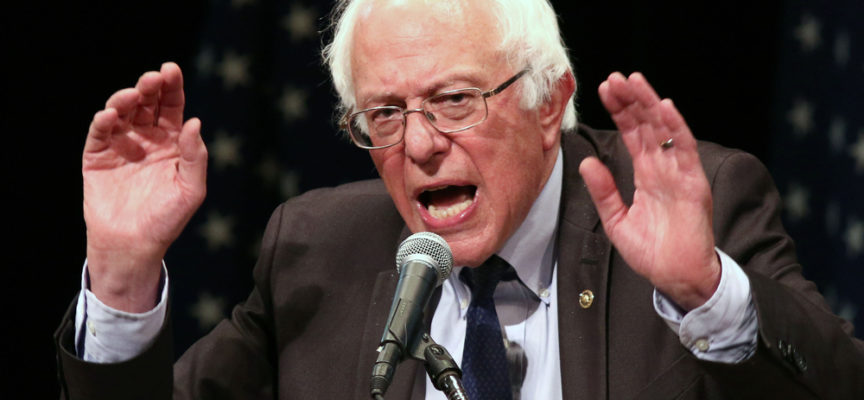A libertarian, a socialist, and a nationalist walk into a bar. I only know because they each told everyone within two minutes.
That’s a joke.
But jokes aside, socialism is one of several highly-energized and mobilized political movements—especially among Millennials—in the United States right now. The 2016 presidential primaries saw a self-proclaimed democratic socialist, Bernie Sanders, almost defeat establishment candidate Hillary Clinton. The 2018 mid-term elections saw a 28-year-old democratic socialist, Alexandria Ocasio-Cortez, defeat incumbent House democrat Joseph Crowley. A recent Gallup poll revealing that 57% of Democrats are favorable toward socialism while only 47% of are positive toward capitalism.
Most interesting, perhaps, is the fact that the Democratic Socialists of America (DSA) have seen their membership grow sevenfold since the 2016 election cycle, from approximately 6,000 to more than 43,000. And, although that is still a small number, it’s time for us to pay attention to the emergence of specifically American forms of socialism.
In light of these phenomena, and in considering the robust response form my recent article on “The Religious Problem with Socialism,” therefore, I offer this brief article describing and evaluating the DSA’s beliefs and policy initiatives.
The DSA’s Ideological Commitments
The DSA views capitalism as an inherently oppressive system. Instead of fixing capitalism, they want to do away with altogether. “Nothing short of the abolition of class and the overthrow of capitalism,” writes Sean Monahan on the DSA website, “will allow for true political democracy in the republic.” A good first step toward ridding America of capitalism, many DSA members argue, is handing over certain significant social sectors and cultural institutions—such as healthcare and utilities—to the government.
As for democracy, the DSA wishes to make bold moves such as abolishing the United States Senate. As they see it, the least democratic of America’s Founding Fathers pushed for a Senate modeled after the British House of Lords, in order to maintain the ability to block the will of the American people. As such, they argue, it makes a mockery of the democratic principle of majority rule.
The DSA’s Policy Initiatives
As Michael Ahrens recently noted, the Democrats have been moving toward socialism for some time, as evidenced by four specific policy initiatives:
- Single-Payer Health Care: Bernie Sanders and more than half of Congressional Democrats endorse government-run health care despite overwhelming evidence of its failure globally.
- Free College: Sanders and a number of Democratic legislators are now pushing for free college despite historical evidence of its negative effect globally on education and on economies at large.
- Government-Mandated Wage: Sanders and more than 25 legislators are pushing for government-mandated wage, in spite of precedent that such a move will likely cause layoffs, payroll cuts, and hiring freezes, which in turn drive down the median income for low-wage earners.
- Universal Basic Income: Barack Obama recently encouraged Americans to implement a universal income, in spite of the fact that it would double the national debt, thus dragging down the American economy and once again hurting low-wage earners.
But the DSA is layering on its own initiatives, which include:
- The election of DSA Candidates: the most prominent DSA-endorsed candidate is Cortez, but she is joined by other candidates, such as Summer Lee and Sara Innamorato, who defeated incumbent representatives Paul and Dom Costa and who now run opposed in the general election.
- The promotion of “Medicare for all”: similar to other well-intended Democratic healthcare proposals, this one will cause “problems for all,” not only dragging down the economy, but extending the wait-time and reducing the quality of health care.
- The formation of worker-run cooperatives: the DSA offers to advise and support workers who are negotiating for a better deal with their employees, but initiative is only a step toward their real goal: the formation of worker-run collectives.
An Evaluation of the DSA
In last week’s article, I argued that Marxist socialism is a false religion that shuts down human freedoms—including freedom of religion—and kills economies. But what should we make of the emergence of the DSA and distinctively American iterations of democratic socialism?
On the one hand, we should recognize the good intentions of many Americans who are pushing for socialism. Despite the existence of professional agitators and people of bad will in the socialist movement (as with any other movement), there are many good and warm-hearted people out there who simply want the best quality of life for the most people. And with those people, we have a common concern and common ground.
On the other hand, as I see it, the best way to achieve the highest quality of life for the greatest number of people is the existence of a healthy free market. This is not to say that a free market by itself guarantees human flourishing. It does not. Conservatives have always given “two cheers for capitalism,” not three, because we have a low view of human nature and therefore recognize the need to always be on guard against the corruptions and crony behavior that warp the market.
History has not smiled on the socialist project, as evidenced not only by the totalitarian politics and poverty-inducing economics exhibited by the Soviet Union, but also the recent and severe failures of socialist nations such as Venezuela. Even the Socialism Lite® of nations such as Canada and the U.K. have drug down the economy and hurt the very sectors—such as healthcare—that it was supposed to help.
Why can’t democratic socialism deliver on its promises? As political scientist Hunter Baker notes in an article about Socialism Lite®, the problem is multi-faceted. Consider that:
- Democratic socialists think they can overcome the abysmally poor quality of Marxist socialism’ products by permitting private business but exerting ideological control over it. Although the United States already regulates the economy fairly heavily, the democratic socialists would regulate it more heavily. One problem with this plan, as Baker notes, is that the state becomes “largely unaccountable.”
- Democratic socialists think the state has a right to exert such extensive control. But, at least under our American Constitution, this seems a violation of our freedoms and a subversion of our Constitutional political arrangement.
- Democratic socialists reject the wise rule of thumb that the government should tax as broadly, and at as low a rate, as possible. They think they are taking the moral high ground and making economic progress by placing enormous tax burdens on business owners and wealthier citizens. But there isn’t enough money to do that. Eventually the taxes not only harm the small-to-medium businesses that are supporting the taxation, but also drive the larger businesses and wealthier individuals out of the country. Ironically, as Baker notes, the better way to pay government bills is to reduce corporate taxes. In recognition of this real world truth, Socialist Lite® nations such as Denmark and Sweden have significantly cut their corporate tax rates.
And, as I argued recently in “The Religious Problem with Socialism,” ideological socialism functions as a false religion. It ascribes ultimacy to the idea of material equality and offers a critique of society that becomes inherently totalizing (including every sphere of culture) and radical (seeking to reconstruct from the roots up).
Making Most Things Better for Most People
To be clear, Bernie Sanders and his more-stoutly-socialist comrades from the DSA are right that America’s free market has its fair share of problems. They are right to empathize with, and work hard to help, America’s working class. Every American should recognize these problems, share these empathies, and make a concerted effort to help our working-class neighbors flourish.
But democratic socialism will not make things better in the long run. It might make some things better for some people in the short term, but it will make most things worse for most people in the long run.
What we need to do is work toward an appropriately-normed free market that, as Baker puts it, makes it “easy to do business, easy to work, easy to pay taxes, and easy to collect them.” We need the government to reign in its irresponsible spending. We need to crack down on corruption and crony capitalism.
If we do this, we have a good shot at making most things better for most people, including low-wage-earners, in the long run. And that is something for which we can give three cheers.
Subscribe
Never miss a post! Have all new posts delivered straight to your inbox.







